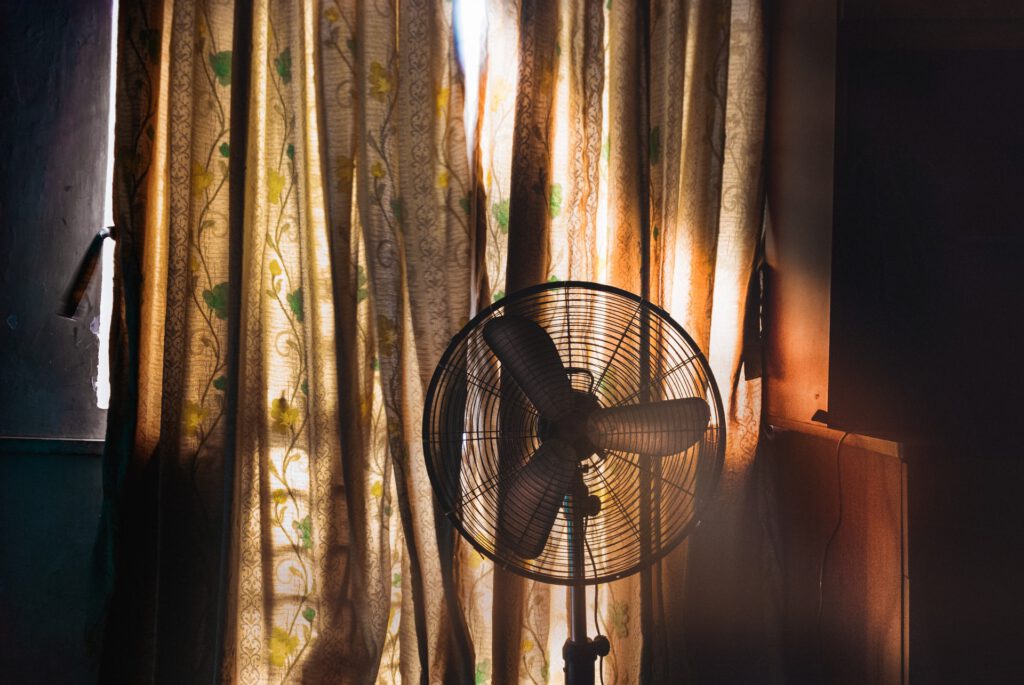Keeping cool in the heat – 5 tips from scientists

In the UK we have to be prepared for wide-ranging temperatures, and in the summer it looks like we may increasingly hit the mid 30s. The Physiological Society – an association of health scientists – has set out some helpful advice to help you stay cool. But they also carry a word of warning about the possibly fatal effects of cooling off too quickly.
Drink plenty
In hot weather it is important to reduce the risk of dehydration. Hydration maintains good cardiovascular function and helps your body sweat. This is essential to maintaining a normal body temperature. You can tell if you are hydrated, because your urine will be a very pale straw colour pale. If you’re not sufficiently hydrated, your urine will be darker, because your kidneys are trying to save as much water as they can.
Use a fan
Sweating is good because it helps us control our body temperature. When sweat is evaporated into the air, it cools the skin. Fans can speed up this evaporation process and increase convective cooling. You can further enhance evaporation cooling by misting your body with water and wearing light, loose clothing.
Wear sunscreen
Any exposed part of your body – including earlobes, scalp and lips – can burn. Sunburn compromises skin circulation and sweating and can therefore limit the body’s ability to get rid of heat. Additionally, the ultraviolet radiation absorbed by the skin from sunlight can damage the genetic material in skin cells, increasing the risk of skin cancer.
Avoid exercising when it’s hot
Exercising in the heat puts extra stress on your body by increasing muscle blood flow and your body’s core temperature. The increased demand for skin blood flow in the heat can, especially if combined with dehydration, compromise muscle blood flow, which in turn reduces oxygenated delivery to the muscles and causes heat exhaustion. The heart also has to work harder to maintain circulation.
Put your hands in cold water
Our hands have a high surface area-to-mass ratio and there are specialist blood vessels in the fingers that have high blood flows in the heat, making them ideal areas for exchanging heat with the environment. That means that when you immerse your hands in cold water, heat can be quickly lost from the body, and that lowers your body temperature.
NB – don’t cool down too quickly
It’s tempting to jump into the sea or an open body of water to cool off. However, sudden submersion in cold water can be fatal. Mike Tipton, Trustee of The Physiological Society, and Professor of Human and Applied Physiology in the School of Sport, Health & Exercise Science at the University of Portsmouth has been researching the body’s response to sudden immersion in cold water for the last 20 years. He says:
‘Jumping into cold water (below 15 ⁰C) can evoke the “cold shock” response, which includes an involuntary gasp response followed by uncontrollable hyperventilation. This response is incredibly dangerous if you are in water because the 2-3 litres gasp is greater than the volume of water (1 -3 litres) in the lungs needed to drown.’
We lose around 400 people a year to accidental immersion-related deaths, drowning rates go up during heat waves. Professor Tipton believes quite a lot of these deaths are avoidable if people understand some basic physiology.
‘Education = survival. The more people know about the cold shock response, the more they can take steps to protect themselves. We see the largest physiological response to immersion in cold water in the first 90 seconds. The cold shock response is greater if you enter the water faster. Therefore, the secret to survival if you must enter the water, is to do it slowly or partially. If you find yourself in cold water, either intentionally or accidently after falling, resist the urge to thrash about or swim until the cold shock response passes. It is important to relax and float to keep water away from your airways until your breathing is back under control. Allowing your body time to adapt to the cold water will decrease the risk of drowning.’
Read more tips about keeping cool in the heat:
- Advice on keeping cool in a heatwave
- Who’s vulnerable and how to keep cool in hot weather
- Practical ways to encourage older people to drink more fluids
Photo by Akshar Dave🌻 on Unsplash
